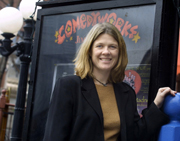
Anne Woodrow: The waitress took notes.
Photo by Andrew Dobrowolskyj
|
by James Martin
A funny thing happened to Anna Woodrow while writing her PhD dissertation
about media representations of native people during the 1990 Oka stand-off:
She changed her mind.
When she moved to Montreal to pursue her master’s degree at Concordia,
she also began a four-year stint waiting tables at the Comedy Nest nightclub.
“I was only working there to make money, but I ended up ingrained
in the world of stand-up comedy without actually being a comedian myself.”
Woodrow was still working at the club when she started her PhD, also at
Concordia. Early in her Oka research, she encountered obstacles (including
high copyright fees for reproducing news footage, as well as reluctance
among the people to trust an outsider) that left her a little discouraged.
“I was out for a jog one day. Some things had happened while I was
working at the club the night before — I can’t remember what,
exactly. Because I was so aware of audience reception and had all this
theoretical background, I was constantly doing mini-analyses of the activities
in the club.
“I knew how easy it would be for me to access the world of comedy
because I was already in it, even though it’s a very private and
closed place. By the time I’d finished my run, I’d decided to
change my thesis topic.”
Eyewitness to a dog-eat-dog
world
Over the course of the next two years, Woodrow interviewed 41 Canadian
stand-ups and a handful of producers, managers, and agents. Most of her
subjects came to her, so to speak (attracted by the comedy beacon that
is the Just For Laughs Festival), but Woodrow also hit the road, travelling
across country with a group of comics.
She witnessed firsthand the bizarre crucible in which our country’s
comedic talents are forged (or broken), a dog-eat-dog world of long drives,
late nights, hostile crowds, isolated rural venues, hard-nut club owners,
questionable accommodations, and worse.
“What stand-up comedians have to go through in Canada, is Hell. They
start out getting maybe 50 bucks for a show — that’s if they’re
getting paid at all,” Woodrow said.
“One comedian told me about the time a guy burst through the door
on a motorcycle, drove right up to the stage, revved his motor, then rode
back out. The comedian left the stage, went over to the bar, and said,
‘I want to see the manager right now.’ And the bartender said,
‘That was the manager.’”
(Ba-dum-bum!)
This isn’t to say that Hell doesn’t have its up-side. “Canada
is one of the best training grounds in the world for stand-up comedy,”
Woodrow said.
“It sucks the life right out of you, but — because of the size
of our country, because of the variance between the regions, because of
the desperate nature of it — it creates really well-trained, really
adaptable comedians.” (Woodrow added they would nevertheless jump
at the chance to relocate to the far more lucrative U.S. market.)
Woodrow conducted clandestine audience research during her shifts, literally
crouching down among the front-row hoi polloi to take mental notes on
“the dance between the performers and audience.”
This undercover tactic not only afforded her an insider’s vantage
point (“I was invisible, and could see all kinds of things happening
that the average person sitting at the back of the room would not catch”),
but opened a lucrative avenue of alternative academic funding: “Because
I was in the middle of things all the time, I made more money than the
waitresses waiting for people to call them over!”
With her dissertation (“Why are They Laughing? The Re-formulation
of Identity in Canadian Stand-up Comedy”) completed, and having delivered
the valedictory at convocation last November, Woodrow is now teaching
humanities full-time at John Abbott College, as well as working with Dr.
Bill Reimer on a major Concordia research project concerned with changes
in the Canadian rural economy.
She’s hoping to spin her dissertation into a book, noting that “very
little has been written about stand-up comedy in Canada.” There is,
however, one thing she won’t be doing any time soon.
“I’ve never, ever tried to go on stage and be a comic of any
kind,” she said firmly. “I love stand-up, but I can’t write
a joke for the life of me. I have horrible timing as well. I’m serious:
I’m not funny at all.”
|
|
|



